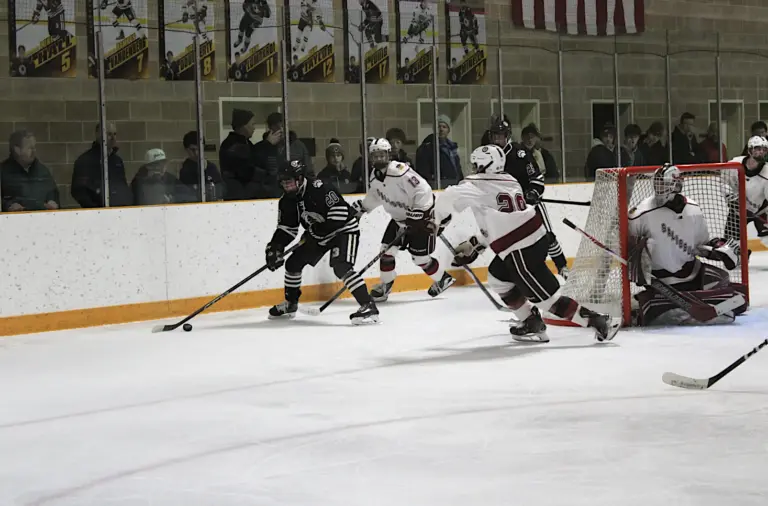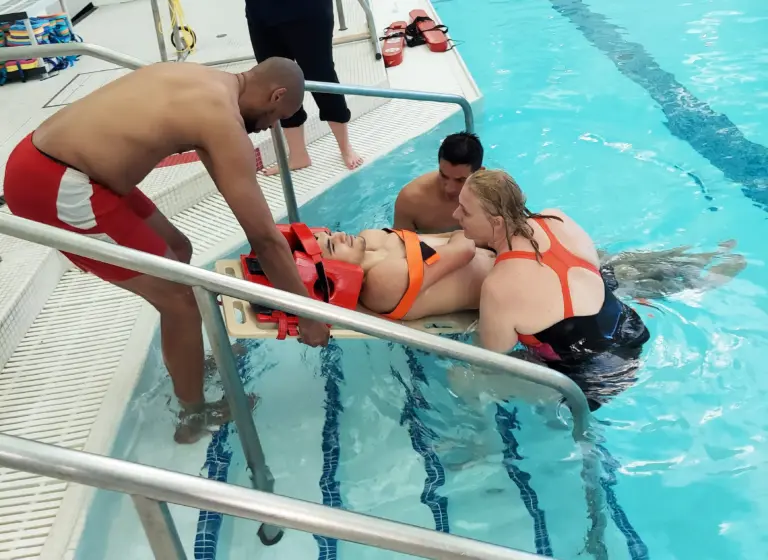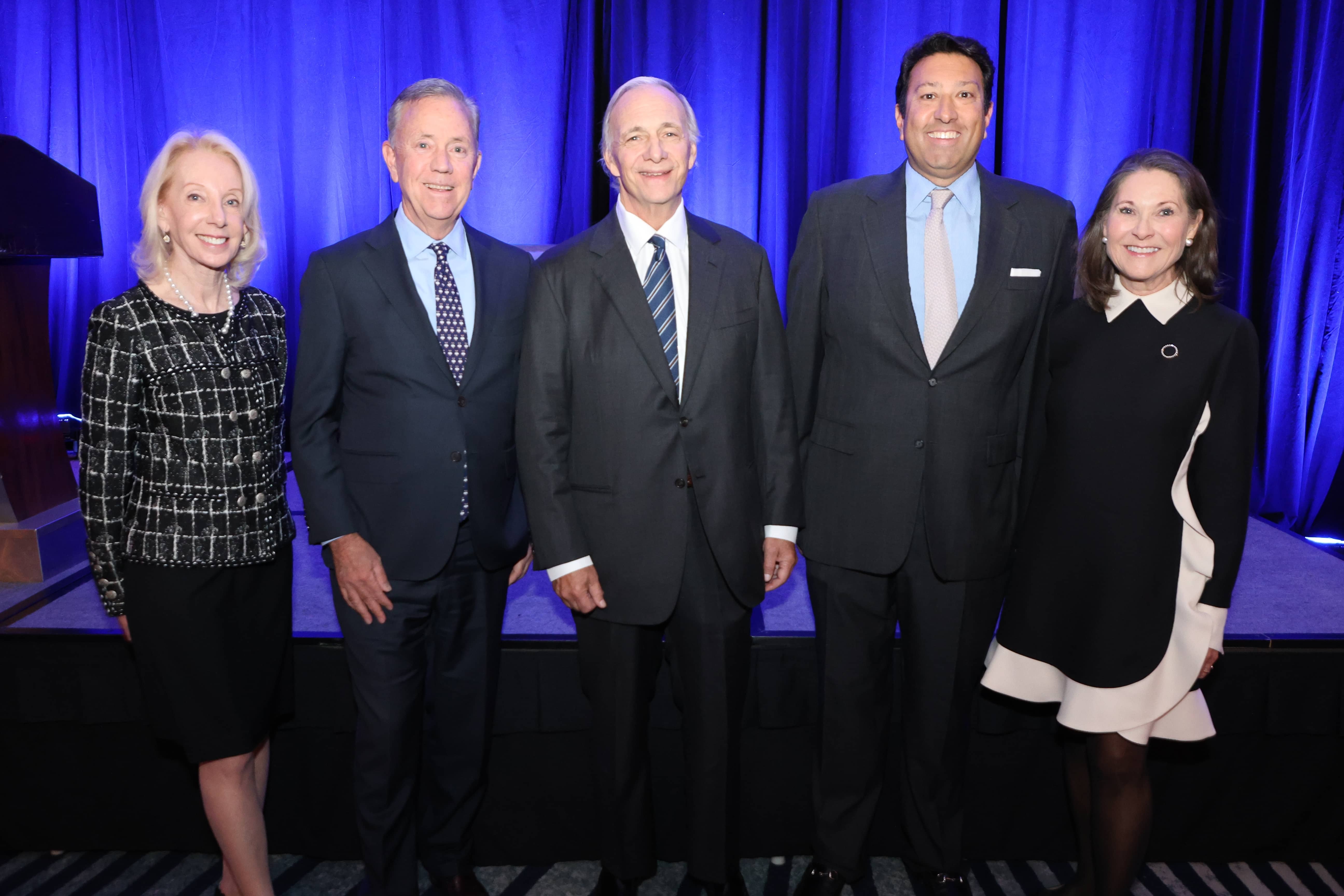
By Anne W. Semmes
A celebration of legendary hedge funder Ray Dalio as the Greenwich Library’s 2024 Peterson Awardee, introduced by Governor Ned Lamont, brought a record of some 400 attendees to the Library’s Peterson Award dinner at the Hyatt Regency last Thursday week. The evening also brought “the highest grossing Peterson dinner ever,” announced Library Board Chair Peggy Edersheim Kalb.
In the evening’s featured fireside chat Dalio as founder of the world’s largest hedge fund, Bridgewater Associates would expound on a wide range of subjects as questioned by CNBC Leslie Picker. But first off it was Greenwich-rooted Dalio’s extraordinary Connecticut philanthropy that radiated from Governor Lamont’s introductory sharing. The Governor had come to know Dalio and wife Barbara, “really well” during Covid. “We were at ground zero, and everything was shutting down,” he said. And hospitals began calling, saying, “I can’t get my nurses and doctors to come in. There’s nobody there to take care of their kids. We’re going to have to close down too.” Lamont called Dalio, and “within three weeks, we had daycare set up next to every major hospital in the state of Connecticut, thanks to Ray Dalio.”
Then came that need for masks. “I figured I was on a roll,” Lamont thought. “Then all of a sudden everybody’s protesting,” especially those working in nursing homes, and caregivers. “No masks, no work.…Everybody had run out of masks, and everybody’s using scarves and T-shirts…Again, I called Ray Dalio. Ray said, ‘I can solve this for you. I’ve got friends around the world.’ We put together a plan. It was planes, cars, trucks, and we got millions of masks right when we needed them… And Ray stepped up there, and there were hundreds of nurses cheering as the trucks rolled in, and we had our millions of masks.”
Then came long Covid. And with it told Lamont came “a real sense of profound loneliness in how it’s hit our kids…We had 25 percent of our kids not going back to school. They feel disconnected from their friends and from themselves in some way.” Up stepped Dalio with wife Barbara. “They put in place the coaches and the guides and the friends and the shoulders to lean on. We reached out to the kids. We were knocking on doors. ‘We miss you at school.’ Thanks to Barbara and Ray, they’re going back to school.” He said to Dalio, “I think you should share this [Peterson] prize with Barbara Dalio, ” as both have he said, “a sense of mission, a sense of purpose.”
Music and Community Building
Add to that philanthropy the upcoming Dalio-founded Greenwich Town Party. Thus, Lamont concluded by directing the audience to, “Think about the liberating spirit of books and music and what that Peterson Award really means. Go right into the Greenwich Public Library…put on your earbuds, maybe listen to a little Miles Davis and bring out that ‘Principles’ book by Ray Dalio. It’ll blow your mind… Thank God for Ray Dalio. Congratulations, my friend.”
“Barbara is the one, really, who should receive this award,” followed Dalio [with applause]. He praised the Governor as “a bipartisan governor, which is a rare beast nowadays, and he’s smart and caring…To be governor of all the people in Connecticut, because there are great differences and great sufferings, to represent them both is something not only admirable, but jaw-dropping… then also to bring businesses and everything there. So, thank you very much.”
“This is my community,” Dalio wished to say. “This is my home. You are my tribe. There are so many people here that I have loved for 30 years. We have roots together…And what the library’s meant to all of us…It’s like a center that draws people for all forms of enrichment, cultural enrichment…reading groups…lectures. What an incredible blessing that we are here to celebrate…I’m so grateful.”
The first fireside chat question of CNBC’s senior finance and banking reporter Leslie Picker was, “What is it that keeps you connected to this community as I’ve read you are one of the top donors to the state?” “The most important thing is community,” he answered. “Happiness has been studied a number of times…And there’s no correlation between the amount of money you have past a certain basic level and the level of happiness that you have. And the number one determination of happiness is community. And the community, the people that I love, the things that we were talking about, that’s what keeps us in Connecticut.”
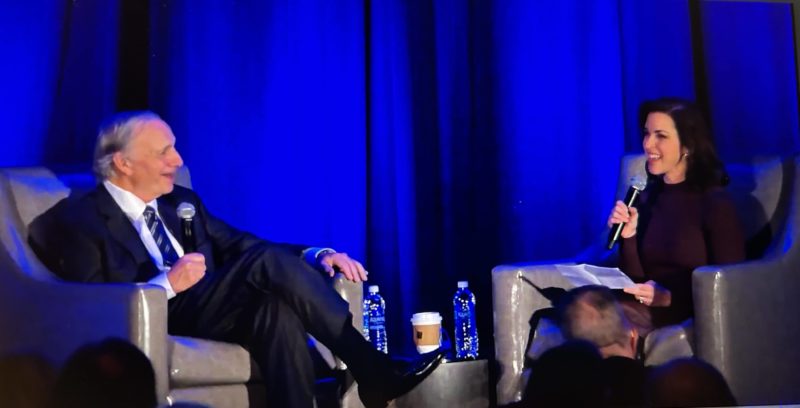
Dalio’s Five Forces Driving Everything
So, having stepped down 18 months ago from day-to-day running Bridgewater Picker noted, after building the world’s largest hedge fund, what was keeping him busy? “I’m still passionate about the markets,” he said. “It’s a game I started playing when I was 12, so I am still involved with that.” But he’s also “passing along philanthropically,” what he’s learned. “My grandkids are driving me crazy. I love my grandkids. I’m into ocean exploration. I love watching what Barbara’s doing in Connecticut and tagging along. So, it’s a wonderful mix.”
Another Picker question triggered Dalio’s sharing what he had learned from his told passionate study of history. She began, “There’s a lot affecting the business world right now…like we’re at this inflection point, particularly as it shapes the world order…business leaders are sounding the alarm about the US deficit, something you’ve been acutely focused on. How sustainable is the U.S. debt, and what does that mean for the overall economy, and the world order, as you see it?”
He would answer her question “about the debt and interest rates.” But first he wanted to share “five big forces that are driving everything,” and the interrelationship between them, learned from his history studies. And the first force was debt. “Debt and credit are what we spend, and then there are their effects on the economy and everything. We’re producing the largest amount of debt…” And force number two was “the internal conflict factor. The populism of the left and the right, the irreconcilable differences, the wealth gap and the values gap that are causing populism, that even threaten our democracy.”
And “The third force is the great geopolitical force. We know that the world order is changing, because the United States is no longer the single dominant power, and that competition, the wars that we’re having around are unique. And number four, even more important than the first three in terms of changing things, are acts of nature, droughts, floods, and pandemics, and with climate…through history have caused more deaths and toppled more domestic and world orders.” And number five: “Throughout history is man’s inventiveness, particularly of new technologies…For example, the new world order began in 1945, when the United States won the war…”
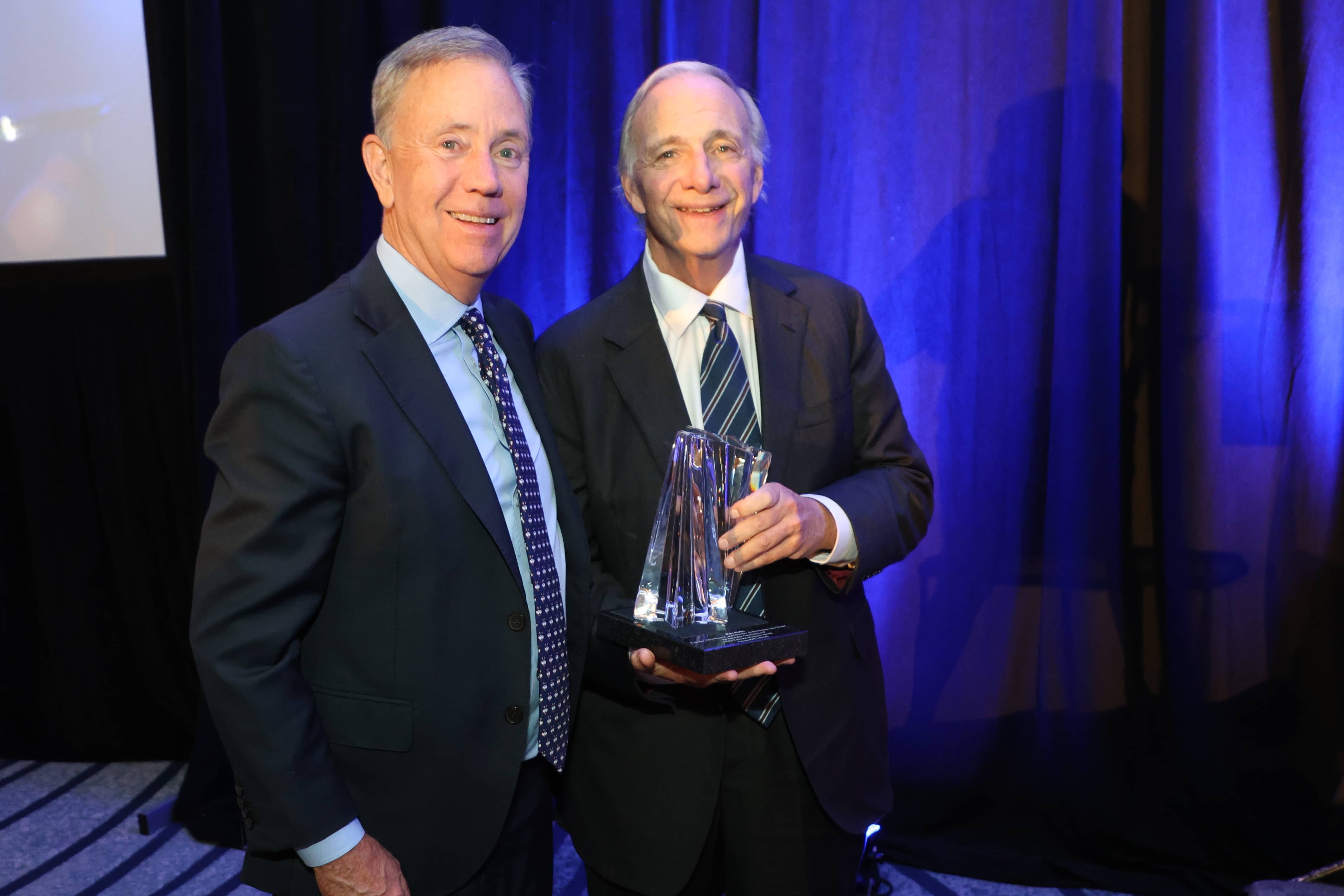
Debt, Climate Change, and the Younger Generation
He then answered Picker’s question on the issue of debt. “One man’s debts are another man’s assets. As they rise, interest rates have to be kept high enough that the creditor is satisfied without having interest rates so high that the debtors get themselves in trouble. And that balancing act becomes more and more difficult as there’s more debt assets and more debt liabilities…We have to pay off the debt.”
But there was that cost of climate change. “It’s estimated that dealing with climate one way or another, either for preventing climate problems or dealing with climate problems is $8 trillion a year…estimated worldwide.” And when we think about issues like defense and the military and the nature of the conflicts that are taking place – the United States has bases in 80 countries. So, all of these things are expensive.”
In ending Dalio was upbeat. “There’s a big conflict between nationalism and globalization,” he noted. But in his travels of the world, he’s seen “all these different nationalities working together and there’s a vibrancy and inventiveness, and that kind of creativity I think is fantastic.” He also admires “the young generation, their vibrancy.” He sees “a greater spirituality or caring of the younger generation” allowing them a level of communication in how they operate with each other.” “I think,” he said, “they’re going to do a much better job than my generation.”

